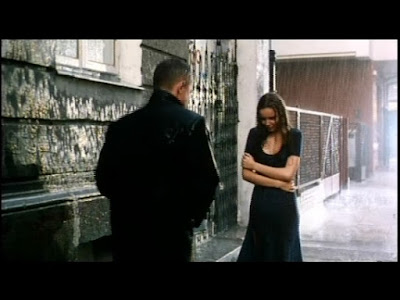Leon (Boguslaw Linda) is a decorated soldier, returning home to his loving wife and two child daughters after a tour. While he is in the kitchen of his flat with his wife, Leon carelessly leaves his pistol in open view. One of his daughters picks it up and fires it at her sister. Cut to a few years later and Leon is still in his flat, but his wife and child have left him. He has been seeking serious solace in the bottle. He gets a call from one of his homies to meet a wealthy client for a protection job. Leon arrives at the meeting place, an upscale bar, and is immediately rebuffed by the wealthy client for being a drunk. A trio of armed thugs storm the bar, and Leon saves the client’s life. As gratitude, the wealthy client gives Leon a job and helps him clean up his life. The job he gives Leon is simple: protect his teenage daughter, Sara (Agnieszka Wlodarcyzk), as the wealthy client’s enemies may harm her to get to him. This job turns out to be simple but not easy for Leon…
The narrative of Sara is the romantic comedy, familiar in the American tradition. Leon and Sara’s relationship begins with playful antagonism: initially, Leon’s only real task is dropping off and picking up Sara from school. One evening, however, she wants to attend the basketball game and dance after. Leon shadows her the entire evening, and visibly irritated and perturbed, Sara steals the car keys from one of her bodyguards and escapes in the car. Leon gives chase on foot, and Sara has an auto collision on the road. From within the other car emerges an armed assailant, and Leon shields Sara with his body, absorbing the bullets and saving her life. (Leon was wearing his bulletproof vest and survives. Sara’s father moves him into his manor to recuperate.) Leon now wants to quit but Sara won’t let him: she has declared her love for him. Leon has a bit of dilemma regarding the coquettish young lady’s feelings.
Subsequent to his tragedy, depicted in the first act of Sara, the viewer can clearly discern
that Leon has a death wish. There is not
much that he is willing to lose or afraid of risking. Sara begins after her declaration of love
seducing Leon, and Leon, after some initial reticence, complies to having a
sexual relationship with her. Sara’s
seduction scenes take upon the oddest aspect:
each composition seemingly is not a subjective composition, intended
solely for the character of Leon; but rather, the compositions of Sara seem
directed towards the viewer. While the
dialogue remains playfully antagonistic between the two, there is something
disturbing about Sara’s seduction scenes.
Slowly, Leon begins to articulate warmer feelings towards Sara, and the
two have a dinner date at a Chinese restaurant.
They have a sweet tango scene on the dance floor (a la Scent of a Woman (1992) and True Lies (1994)). Included also is a scene where Leon, in his
flat of all places, rides in circles upon his bicycle while Sara rides upon the
handlebars. (I almost started humming
“Raindrops keep falling on my head” during this scene.) The juxtaposition of Sara’s seduction scenes
with the sweet, romantic comedy scenes give Sara
an odd, off-putting vibe. (Not to
mention the John Woo-esque finale in
the final act.) Like the Kick-Ass films, this quality makes Sara both simultaneously disturbing and
alluring, which is quite a unique feat.
Sara is well done
in all technical aspects. The leads are
quite good in their roles. Most of the
comedy, even when it becomes repetitious, remains fresh and funny. In the end, Sara is probably the sleaziest film that is also kind of sweet.



No comments:
Post a Comment